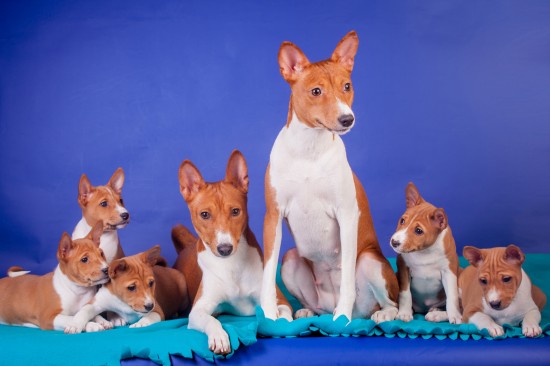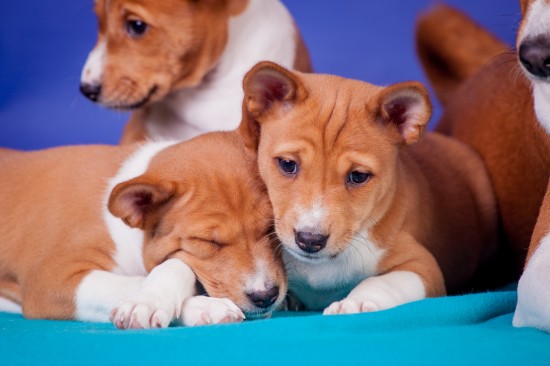


When you are shopping around to find your potential future puppy, not only will you probably visit a variety of different breeders and litters, but you will also be faced with the choice of which puppy you actually wish to own out of the litter you finally decide is the right pick for you!
Even within litters of very young puppies under 12 weeks old and still with their dam, baby dogs will already begin showing the signs of their future personalities, which can give you a helpful insight into the temperament and mood your puppy is likely to display even as they get older. While young puppies are very malleable in terms of how their future development can be shaped by handling and training, even so, there can be significant differences in how different puppies within the same litter behave, act, and view the world. Once you can differentiate between these different moods and personalities, you will be able to make an informed decision as to the best fit for your own family and situation.
Dependent upon the size of any given litter, you might not view all of the following personality types outlined below within the same set of puppies. Of course, the presence of the other puppies and their relationships to each other may in many ways also dictate the behaviour of any particular litter member, which may then become more or less pronounced once they are away from their canine family.
The “boss” puppy is likely to be the litter member that is slightly larger than all of the others, and may already be in the formative stages of taking the alpha role over the other puppies in the litter. They will generally be the first one to feed, and not shy about pushing other puppies out of the way to get to a teat! They may also appear to be slightly further along in terms of their development than the other litter members, instigating games and play fighting, and leading the other puppies’ behaviour. This puppy is likely to be a bold, outgoing and intelligent dog, which will require a confident handler!
Not every litter has a runt, but if present, the runt will be the smallest member of the litter and the one that needs a little extra special care and attention to ensure that they can feed enough, and are not left out by the other puppies. The runt may continue to need a little extra help when weaned, and careful consideration given to catching up with their physical development.
This is the puppy that has learnt that people love him or her, and that getting attention and love is highly enjoyable! They will almost certainly be very confident with strangers and very friendly to you, and may soon catch your heart through their cute behaviour and obvious appeal for your attention. As an older dog, they will likely continue to be very loving, but may be prone to becoming clingy.
This is the pup that never strays far from their dam, and feels at their happiest when they are beside the mother dog. Because this puppy will probably not make a huge effort to come and say hello to you, they may be overlooked in favour of the other pups clamouring for attention, and may even appear to be upset or nervous if you pick them up and remove them from their dam.
This pup may find the transition from being with their litter to being with a human family quite challenging during the early days, and may display signs of separation anxiety. However, properly handled and managed, this pup is the one that is likely to be the most loyal, and build the strongest bond with you.
This is the pup that is into everything! They want to sniff you, climb on you, chew your fingers, pull your shoelace, show you their toys, and generally get out there into the big wide world and find out about everything that there is to know! This puppy is not at all shy and is unlikely to be affected by nerves over new situations, and may well be a good pick for higher-level training or canine sports. However, they may also prove to be challenging to train, as they are so inquisitive, and may be prone to picking up bad habits if you do not keep them adequately entertained and cater to their growing needs!
The shy one will generally watch you from a distance, being alert and interested in what is going on, but not keen to push themselves forwards and put themselves out there. They are likely to err on the cautious side throughout their lives, but once they have bonded with you and accept you as their family, they will forge a close relationship with you and their true personality will really begin to shine through.
If you visit the litter more than once and find that one puppy is asleep or on the verge of sleep while the others are all active each time you see them, you have found the quiet one! While this pup may simply be catching up on their sleep and is possibly as active as the others at other times, you may have found yourself looking at a dog that is simply a little more laid back and sedentary than the rest of the litter.
This pup may be a good pick for an owner looking for a laid back dog that isn’t too excitable, but be sure that the pup isn’t simply sleepy only at the times that you visit, and also, that their subdued behaviour isn’t the result of ill health or an underlying condition.
None of the puppies within the litter should appear to be sick, hurt, or seriously frightened of you or other people, unless they are being crowded and overwhelmed. Puppies that cower, snap, growl or yelp in fear when you handle them have probably been handled inappropriately or incorrectly cared for by the breeder, and will require special care and training to counteract this.
If you have any concerns about a litter that you visit or the way that they are being cared for, speak to an organisation such as The Dogs Trust or the RSPCA for advice.
Copyright © 2005-2016 Pet Information All Rights Reserved
Contact us: www162date@outlook.com